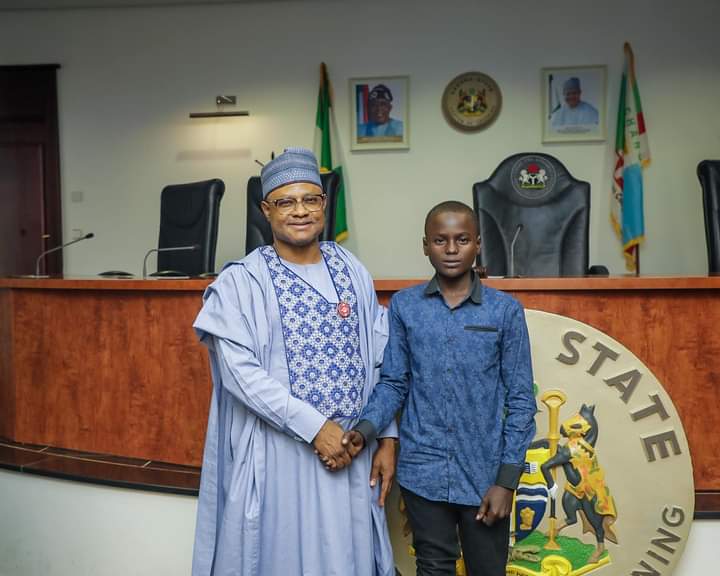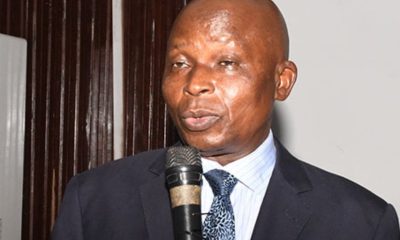Headline
We Paid N250m To Free 121 Abducted Baptist Students – CAN

The chairman of the Kaduna State chapter of the Christian Association of Nigeria (CAN), Rev. John Joseph Hayab, has disclosed that a ransom of N250 million was paid to secure the release of 121 students of Bethel Baptist High School in Kaduna who were kidnapped by bandits in July 2021.
Rev. Hayab made this revelation during a courtesy visit to Governor Uba Sani in Kaduna. He also clarified that Treasure Ayuba, the last Bethel student who escaped from captivity about a week ago, did not willingly choose to remain with the kidnappers, as claimed in some quarters.
The CAN chairman stated that efforts were made to secure Treasure’s release, including sending ransom money to the kidnappers on two occasions, adding that the total sum paid to finally secure their release amounted to N250 million.
“Today, we gather here with mixed feelings—relief, joy, and gratitude. We are here to welcome back Treasure Ayuba, the last of the students of Bethel Baptist High School, Kaduna, who [were] marched out while in their sleep in the school hostel and kidnapped on the night of July 5, 2021, by bandits,” Rev. Hayab stated.
He explained the challenges faced by Treasure’s family, relatives, and well-wishers in securing his release and the subsequent abductions that occurred when ransom money was delivered.
Reacting, Governor Uba Sani assured Treasure Ayuba of the state government’s support and revealed that measures are being taken to enhance the safety of students in schools across the state.
Uba Sani said the establishment of security committees in schools, the deployment of the Kaduna Vigilance Service (KADVIS), and the securing of school premises by building fences are some of the steps to ensure the safety of students and improve the learning environment.
“We have taken steps to safeguard our schools and ensure that our schoolchildren have their education in a conducive atmosphere. We will set up security committees in all schools, ensure the deployment of KADVIS (Kaduna Vigilance Service) to all our schools, and secure our schools by building fences around the school, among other measures,” he said.
Headline
EFCC bars dollar transactions, orders embassies to charge in naira

The Economic and Financial Crimes Commission has barred foreign missions based in Nigeria from transacting in foreign currencies and mandated them to use Naira in their financial businesses.
The EFCC has also mandated Nigerian foreign missions domiciled abroad to accept Naira in their financial businesses.
The anti-graft agency said the move is to tackle the dollarisation of the Nigerian economy and the degradation of the naira
The Commission, therefore, asked the government to stop foreign missions in Nigeria from charging visa and other consular services in foreign denominations.
The EFCC gave the advisory in a letter to the Minister of Foreign Affairs, Amb. Yusuf Tuggar, for onward transmission to all foreign missions in the country.
In the letter, the EFCC said it issued the advisory because the practice of paying for consular services in dollars was in conflict with extant laws and financial regulations in Nigeria.
In a letter dated April 5, 2024, which was addressed to the Minister of Foreign Affairs, Ambassador Yusuf Tuggar, titled: “EFCC Advisory to Foreign Missions against Invoicing in US Dollar,” the EFCC Chairman, Ola Olukoyede expressed dismay over the invoicing of consular services in Nigeria by foreign missions in dollars.
The EFCC cited Section 20(1) of the Central Bank of Nigeria Act, 2007, which makes currencies issued by the apex bank the only legal tender in Nigeria.
The letter read, “I present to you the compliments of the Economic and Financial Crimes Commission, and wish to notify you about the commission’s observation, with dismay, regarding the unhealthy practice by some foreign missions to invoice consular services to Nigerians and other foreign nationals in the country in United States dollar ($).
“It states that ‘the currency notes issued by the Bank shall be the legal tender in Nigeria on their face value for the payment of any amount’.
“This presupposes that any transaction in currencies other than the naira anywhere in Nigeria contravenes the law and is, therefore, illegal.”
The commission further stated that the rejection of the naira for consular services in Nigeria by certain missions, along with non-compliance with foreign exchange regulations in determining service costs, is not just unlawful but also undermines the nation’s sovereignty embodied in its official currency.
The letter continues: “This trend can no longer be tolerated, especially in a volatile economic environment where the country’s macroeconomic policies are constantly under attack by all manner of state and non-state actors.
“In light of the above, you may wish to convey the commission’s displeasure to all missions in Nigeria and restate Nigeria’s desire for their operations not to conflict with extant laws and regulations in the country.”
Diplomatic sources said yesterday, May 10, that some embassies were wondering whether the EFCC’s advisory represented the position of the Federal Government.
Headline
Prince Harry visits sick Nigerian soldiers in Kaduna

Prince Harry and his team visited the 44 Nigerian Army Reference Hospital in Kaduna to interact with wounded soldiers who are receiving treatment.
The Duke of Sussex is in Nigeria with his wife to champion the Invictus Games, which Harry founded to aid the rehabilitation of wounded and sick servicemembers and veterans.
Nigeria joined the Invictus Community of Nations in 2022 becoming the first African country to join.
Prince Harry’s visit to Kaduna came 68 years after his late grandmother Queen Elizabeth II visited the state during the time of the late Premier of Northern Region Sir Ahmadu Bello.




-

 Headline5 days ago
Headline5 days agoSuspend cybersecurity levy– Reps to CBN
-

 Business5 days ago
Business5 days agoNigeria needs over $2bn to revive Ajaokuta Steel Plant, says Minister
-

 Headline3 days ago
Headline3 days agoPrince Harry visits sick Nigerian soldiers in Kaduna
-

 Entertainment3 days ago
Entertainment3 days agoAMVCA Cultural Day: BBNaija’s Neo, Venita win Best Dressed Male, Female
-

 Headline5 days ago
Headline5 days agoTinubu resumes work after foreign trip
-

 News5 days ago
News5 days agoShan George’s money returned to Zenith Bank account
-

 Metro3 days ago
Metro3 days agoEx-Sports Minister laments after hospital neglected him for hours over N80000 deposit





